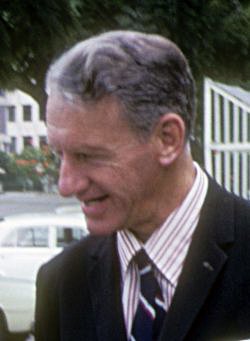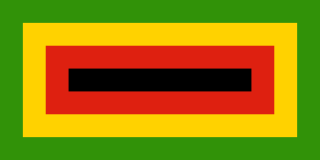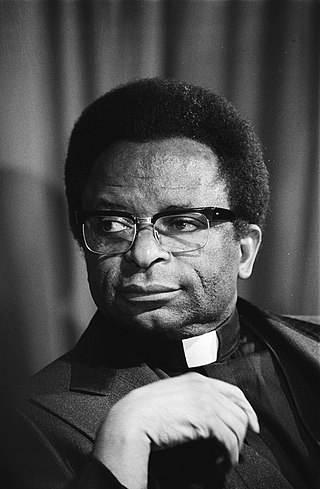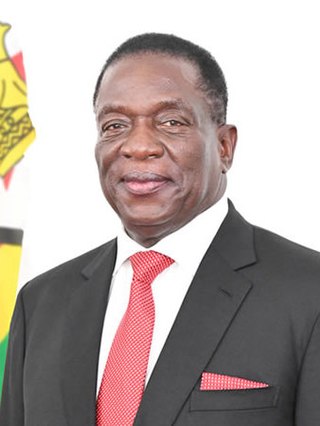Related Research Articles

The Gukurahundi was a series of mass killings in Zimbabwe which were committed from 1983 until the Unity Accord in 1987. The name derives from a Shona-language term which loosely translates to "the early rain which washes away the chaff before the spring rains".

Ian Douglas Smith was a Rhodesian politician, farmer, and fighter pilot who served as Prime Minister of Rhodesia from 1964 to 1979. He was the country's first leader to be born and raised in Rhodesia, and led the predominantly white government that unilaterally declared independence from the United Kingdom in November 1965 in opposition to the UK's demands for the implementation of majority rule as a condition for independence. His 15 years in power were defined by the country's international isolation and involvement in the Rhodesian Bush War, which pitted the Rhodesian Security Forces against the Soviet- and Chinese-funded military wings of the Zimbabwe African National Union (ZANU) and Zimbabwe African People's Union (ZAPU).

The Zimbabwe African National Union – Patriotic Front (ZANU–PF) is a political organisation which has been the ruling party of Zimbabwe since independence in 1980. The party was led for many years by Robert Mugabe, first as prime minister with the Zimbabwe African National Union (ZANU) and then as president from 1987 after the merger with the Zimbabwe African People's Union (ZAPU) and retaining the name ZANU–PF, until 2017, when he was removed as leader.

The Zimbabwe African National Union (ZANU) was a militant socialist organisation that fought against white-minority rule in Rhodesia, formed as a split from the Zimbabwe African People's Union (ZAPU) in 1963. ZANU split in 1975 into wings loyal to Robert Mugabe and Ndabaningi Sithole, later respectively called ZANU–PF and ZANU–Ndonga. These two sub-divisions ran separately at the 1980 general election, where ZANU–PF has been in power ever since, and ZANU–Ndonga a minor opposition party.

Joshua Mqabuko Nyongolo Nkomo was a Zimbabwean revolutionary and politician who served as Vice-President of Zimbabwe from 1990 until his death in 1999. He founded and led the Zimbabwe African People's Union (ZAPU) from 1961 until it merged in 1987 with Robert Mugabe's Zimbabwe African National Union (ZANU) to form ZANU–PF after an internal military crackdown called Gukurahundi in western Zimbabwe, mostly on ethnic Ndebele ZAPU supporters.

The Zimbabwe African People's Union (ZAPU) is a Zimbabwean political party. It is a militant communist organization and political party that campaigned for majority rule in Rhodesia, from its founding in 1961 until 1980. In 1987, it merged with the Zimbabwe African National Union-Patriotic Front.
Herbert Wiltshire Pfumaindini Chitepo was a Zimbabwean politician and nationalist leader who led the Zimbabwe African National Union (ZANU) until he was assassinated in March 1975. Although his murderer remains unidentified, the Rhodesian author Peter Stiff says that a former soldier of the British Special Air Service (SAS), Hugh Hind, was responsible.

Ndabaningi Sithole was the founder of the Zimbabwe African National Union (ZANU), a militant, nationalist organisation that opposed the government of Rhodesia, in July 1963. Sithole's father was Ndau and his mother was Ndebele. He worked as a United Church of Christ in Zimbabwe (UCCZ) minister. He spent 10 years in prison after the government banned ZANU. A rift along tribal lines split ZANU in 1975, and he lost the 1980 elections to Robert Mugabe.

Abel Tendekayi Muzorewa, also commonly referred to as Bishop Muzorewa, was a Zimbabwean bishop and politician who served as the first and only Prime Minister of Zimbabwe Rhodesia from the Internal Settlement to the Lancaster House Agreement in 1979. A United Methodist Church bishop and nationalist leader, he held office for less than a year.

Zimbabwe African National Union – Ndonga is a minor political party in Zimbabwe. Its members were originally part of Zimbabwe African National Union, but split with what would become ZANU–PF over tribal tensions. A portion of the party reunified with ZANU-PF in 2015.

The Rhodesian Bush War also known as the Second Chimurenga as well as the Zimbabwean War of Independence, was a civil conflict from July 1964 to December 1979 in the unrecognised country of Rhodesia.

Zimbabwe African National Liberation Army (ZANLA) was the military wing of the Zimbabwe African National Union (ZANU), a militant African nationalist organisation that participated in the Rhodesian Bush War against white minority rule of Rhodesia.

The Internal Settlement was an agreement which was signed on 3 March 1978 between Prime Minister of Rhodesia Ian Smith and the moderate African nationalist leaders comprising Bishop Abel Muzorewa, Ndabaningi Sithole and Senator Chief Jeremiah Chirau. After almost 15 years of the Rhodesian Bush War, and under pressure from the sanctions placed on Rhodesia by the international community, and political pressure from South Africa, the United Kingdom, and the United States, the Rhodesian government met with some of the internally based moderate African nationalist leaders in order to reach an agreement on the political future for the country.
James Robert Dambaza Chikerema served as the President of the Front for the Liberation of Zimbabwe. He changed his views on militant struggle in the late 1970s and supported the 'internal settlement', serving in the attempted power-sharing governments.

Emmerson Dambudzo Mnangagwa is a Zimbabwean politician who is serving as President of Zimbabwe since 24 November 2017. A member of ZANU–PF and a longtime ally of former President Robert Mugabe, he held a series of cabinet portfolios and he was Mugabe's Vice-President until November 2017, when he was dismissed before coming to power in a coup d'état. He secured his first full term as president in the disputed 2018 general election. Mnangagwa was re-elected in the August 2023 general election with 52.6% of the vote.

Joseph Wilfred Msika, was a Zimbabwean politician who served as Second Vice-President of Zimbabwe from 1999 to 2009.
Articles related to Zimbabwe include:

Robert Gabriel Mugabe was a Zimbabwean revolutionary and politician who served as Prime Minister of Zimbabwe from 1980 to 1987 and then as President from 1987 to 2017. He served as Leader of the Zimbabwe African National Union (ZANU) from 1975 to 1980 and led its successor political party, the ZANU – Patriotic Front (ZANU–PF), from 1980 to 2017. Ideologically an African nationalist, during the 1970s and 1980s he identified as a Marxist–Leninist, and as a socialist during the 1990s and the remainder of his career.
The Zimbabwe African People's Union – Federal Party is a minor Zimbabwean political party, based in Matabeleland. ZAPU-FP split from Agrippa Madlela's ZAPU party, purportedly a revival of those members of ZAPU who had rejected the 1987 merger with ZANU-PF in January 2002, following attempts by a faction of ZAPU led by Agrippa Madlela not to contest the Zimbabwean presidential election, 2002 a ZAPU founder Paul Siwela, was seconded to run as ZAPU's presidential candidate but was blocked by Aggripa Madlela's faction which itself was accused of accepting payments from the MDC which feared that ZAPU's participation in the election would split the anti-Mugabe vote in Matabeleland.

The Victoria Falls Conference took place on 26 August 1975 aboard a South African Railways train halfway across the Victoria Falls Bridge on the border between the unrecognised state of Rhodesia and Zambia. It was the culmination of the "détente" policy introduced and championed by B. J. Vorster, the Prime Minister of South Africa, which was then under apartheid and was attempting to improve its relations with the Frontline States to Rhodesia's north, west and east by helping to produce a settlement in Rhodesia. The participants in the conference were a delegation led by the Rhodesian Prime Minister Ian Smith on behalf of his government, and a nationalist delegation attending under the banner of Abel Muzorewa's African National Council (UANC), which for this conference also incorporated delegates from the Zimbabwe African National Union (ZANU), the Zimbabwe African People's Union (ZAPU) and the Front for the Liberation of Zimbabwe (FROLIZI). Vorster and the Zambian President Kenneth Kaunda acted as mediators in the conference, which was held on the border in an attempt to provide a venue both sides would accept as neutral.
References
- 1 2 3 4 5 Rubert, Steven C.; Rasmussen, R. Kent (2001). Historical Dictionary of Zimbabwe. Scarecrow Press. p. 94. ISBN 978-0810834712.
- 1 2 3 Ndlovu-Gatsheni, Sabelo J. (2009). Do 'Zimbabweans' Exist?: Trajectories of Nationalism, National Identity Formation and Crisis in a Postcolonial State. Peter Lang. p. 120. ISBN 978-3-03911-941-7.
- ↑ Various (2013). Africa: The Adelphi Papers, Volume I. Routledge. p. 25. ISBN 978-1-134-70518-4.
- ↑ Africa: The Adelphi Papers, Volume I, p. 20
- ↑ Jessup, John E. (1998). An Encyclopedic Dictionary of Conflict and Conflict Resolution, 1945-1996. Greenwood Publishing Group. p. 775. ISBN 978-0-313-28112-9.
- ↑ Msindo, Enocent (9 February 2016). "Factionalism and Robert Mugabe's Leadership". In Obadare, Ebenezer; Adebanwi, Wale (eds.). Governance and the Crisis of Rule in Contemporary Africa: Leadership in Transformation. Springer. p. 152. ISBN 978-1-137-56686-7.